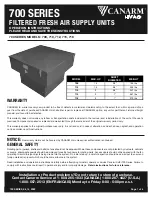
11
Fig. 19
Fig. 18
Fig. 20
Remove the cover from the holder. Attach the
holder with the two screws provided. Replace
the cover into holder. (Fig. 18)
NOTE:
Please remember your control system
is an RF (Radio Frequency) control system.
You may occasionally experience control
problems because of other radio frequency
interference, i.e. fan turns off, light turns off or
won't turn on, speed changes, etc. If this
should happen, just change the “Control
Frequency” by turning the power off and
repeating steps 1 through 6 under System
Programming.
Speed settings for warm or cool weather
depend on factors such as the room size.
Ceiling height, number of fans and so on.
Warm Weather Operation: Forward (counter
clockwise) A downward airflow creates a
cooling effect as shown in Fig. 19. This allows
you to set your air conditioner on a warmer
setting without affecting your general comfort.
Cool Weather Operation: Reverse (clockwise).
An upward airflow moves warm air off the
ceiling areas as shown in Fig. 20. This allows
you to set your heating unit on a cooler setting
without affecting your general comfort.
14. INSTALLING THE TRANSMITTER
HOLDER
15. OPERATING INSTRUCTIONS
Cover
Holder
Screws































